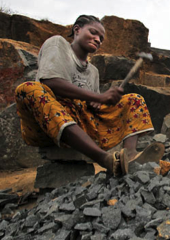Liberia: The True Cost of Education
Mercy Womeh breaks rocks for less than four U.S. dollars a day to afford education to lift herself from poverty in Liberia.
December 8, 2013

Like many Liberians, Mercy Womeh, 18, missed several years of education as a result of her country’s civil wars of 1989-96 and 1999-2003. Three years ago, in a search for work, her family moved from the countryside to a suburb of Monrovia, the country’s capital. Mercy is now catching up with her schooling.
She could go to a free state school. But with overcrowded classes, staff shortages and teachers who often fail to show up, she has opted for a private school.
To complete her last two years of schooling, Mercy has enrolled at J Chauncey Goodridge school, where she is now in seventh grade. She earns the money for her fees by crushing rocks.
In the photos below, photographer Andrew Esiebo — in a selection from the book The Other Hundred — tells Mercy Womeh’s story.
Mercy believes getting an education will transform her life: “When you graduate from high school, you understand things that people who did not go to school cannot understand. The way you speak will be different and you will be able to make decisions that will benefit you and your family. If you are not educated, you are like a tea without sugar.”
The stones Mercy crushes are used in Liberia’s booming construction industry, but little of the country’s economic growth trickles down to people like her. Although Liberia’s economy has grown strongly in recent years, eight out of ten Liberians still live on less than US$1.25 a day.
For each bucket she fills, Mercy earns 35 Liberian dollars – about US$0.50. On a good day, she can fill seven buckets. “How many years have left in school depends on whether I have the money to continue,” she says.
Mercy is already thinking about how she will pay for college in years to come. She says: “I’m doing this because I have no other work to sustain myself. When I get paid for the crushed rock, I pay my school fees. The rest I keep to buy food. Some day I would like to go to college, leave the rock crushing business and set up a more sustainable kind of business. I want President Sirleaf to open more affordable colleges and schools, so when we graduate from high school, we can go to college.”
Education is now free and compulsory in Liberia. In a recent package of reforms to improve academic attainment, the government extended compulsory education by a year. But there are not enough teachers, classes are overcrowded and many children have to work to earn money for their families.
Mercy pays to go to a private school and says state school teachers often fail to turn up for class. “Yes, the education is free [at state schools],” she says. “But there are charges like paying for pamphlets and tests so it is almost as if you are paying. If you don’t have money, you have to drop out.”
Mercy does her homework by the light of a solar lamp. Although electricity has been restored in some parts of Monrovia, it has not reached Gbawe town. Liberia is still a very tough place for women, but Mercy remains positive that education, and her government, will help her change her future:
“I pray there will be a time that I will look up and thank God we have a woman president and the government is helping me to get an education, so I will be able to stop cracking rocks.”

Andrew Esiebo is known for his visual stories and reportages on religions, urban spaces, culture, sexuality and soccer. He has worked with non-government organizations, cultural institutions, universities and magazines. His work has appeared in many exhibitions and international journals and magazines.
The Other Hundred is a unique photo-book project (order here) aimed as a counterpoint to the Forbes 100 and other media rich lists by telling the stories of people around the world who are not rich but who deserve to be celebrated.
Its 100 photo-stories move beyond the stereotypes and cliches that fill so much of the world’s media to explore the lives of people whose aspirations and achievements are at least as noteworthy as any member of the world’s richest 1,000.
 Selected from 11,000 images shot in 158 countries and submitted by nearly 1,500 photographers, The Other Hundred celebrates those who will never find themselves on the world’s rich lists or celebrity websites.
Selected from 11,000 images shot in 158 countries and submitted by nearly 1,500 photographers, The Other Hundred celebrates those who will never find themselves on the world’s rich lists or celebrity websites.Takeaways
Many Liberians missed several years of education as a result of the country's civil wars of 1989-96 and 1999-2003.
State schools in Liberia are free but have overcrowded classes, staff shortages and absentee teachers.
Liberian Mercy Womeh, age 18: “If you are not educated, you are like a tea without sugar."
Although Liberia's economy has grown in recent years, 8 out of 10 Liberians live on less than US$1.25 a day.
Education is now free and compulsory in Liberia, but fees add up. “If you don't have money, you have to drop out."
Mercy does her homework by the light of a solar lamp. Electricity has been restored in only some parts of Monrovia.
Author
The Globalist
Read previous

Mandela, The Man
December 7, 2013





